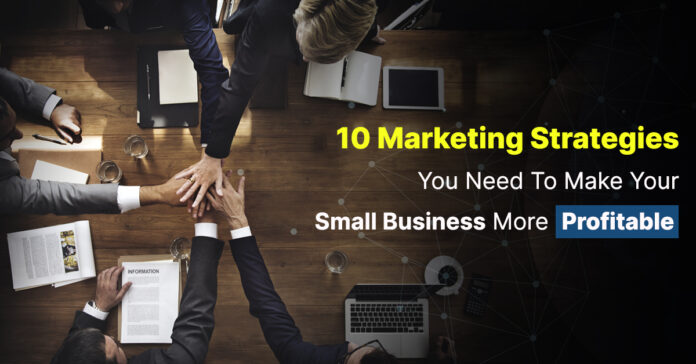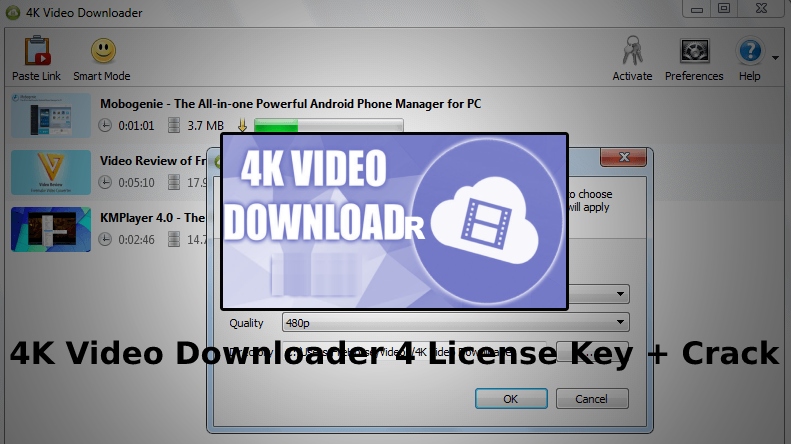For small-scale businesses, marketing is a vital endeavor that directly impacts growth. Whether you are an eCommerce store on a platform like Amazon or another type of business interacting with the market, your outreach strategy is fundamental to expanding your brand’s horizons and increasing your ROI.
On one hand, it takes meticulous planning to create a lucrative marketing plan for a small-scale business. There are numerous factors to consider. Budget is the primary concern, and everything about the strategy has to be constructed with that in mind. On the other hand, being inattentive in this case can make you susceptible to some common marketing mistakes. They can wreak havoc if left ignored or unchecked, undoing whatever progress you’ve made and tearing down your brand value.
So how do you avoid such pitfalls and create a profitable, customized marketing strategy for your small-scale business that brings in profits without hurting your budget? The answer lies in these ten marketing strategies that are tailor-made for a small business like yours.
The 10 Marketing Strategies That Can Solve Your Branding Problems
1. Having An Awesome Website
In this digital age, a business is as good as non-existent if it doesn’t have a website. The impression built by your website in its visitors’ minds determines your brand’s value and success. So, you can leave no stone unturned when developing a website.
There are many aspects of a company’s website that need attention. For instance, the website should carry your brand theme and ethos throughout. This could be in the form of a background image or the overall color scheme. The brand logo must be prominently displayed, with its colors being part of the color scheme adopted. The UI must be easy to navigate, with every section placed in the most visible spaces.
In the case of an eCommerce store site, your content layout must be according to the platform’s guidelines. It should contain a variety of content ranging from plain text to audio and visual elements. You can add external and internal links to improve the user experience. The content must be professional and creative to inform and engage the visitor simultaneously. It must also be fully compliant with search algorithm requirements to ensure better online visibility. Additionally, you must regularly update the site with fresh content and design to keep it relevant. Use the latest web development technologies to give your brand a future-ready vibe and help it stand apart from the crowd.
Undoubtedly, there is a lot to handle if you want your website to be effective. Enlisting the aid of a professional web development agency will prove beneficial as they will be aware of the intricacies of creating and maintaining such a website.
2. Being Socially Active
Social Media is the most potent marketing tool for a small-scale business. These platforms offer opportunities for paid and free advertising along with access to a vast audience. So, the higher number of platforms you choose to engage on, the greater your brand’s visibility will be. However, there is a need to exercise caution regarding the choice of platform. Each of them is different, so you must evaluate whether a social media site suits your marketing requirements or not.
For example, going with Youtube when video marketing is not a priority for you will be a waste of resources. Facebook and Twitter are the two main platforms where you can post a variety of content, including ads. Instagram is very useful for eCommerce sellers as the picture-friendly layout is excellent for marketing products and related content. Pinterest and Reddit can serve as your conversation-style customer engagement platforms. If you’re an Amazon seller/vendor, you can use the site’s new social media-like facilities, i.e., Amazon Live and Amazon Posts to augment your external social media activity. (If you are unfamiliar with these, you can hire Amazon virtual assistants for this type of marketing activity. They are cost-effective resources and hence, a feasible choice for small businesses.)
The best part: the more active you are on social media, the more their respective algorithms and users recognize you. That leads to more free networking for your brand, which is just the thing a small business needs to help its marketing efforts.
3. Not Ignoring Traditional Marketing
Digital marketing is certainly all the rage these days, but that doesn’t mean traditional marketing is past its prime. On the contrary, some forms of traditional marketing may be giving more yields in terms of ROI. So, you must make space in your marketing strategy for the types of traditional marketing that will work best for your small business.
Brochures are a great way to quickly disperse information about your brand to a large audience, especially if you are trying to market locally. Flyers and leaflets also help you market your brand locally by highlighting your best aspects in an easy-to-digest manner. Cable Television and Radio ads still hold sway, especially in the more rural parts of the country. Having stalls/booths at local/regional events, conducting seminars and conferences, and similar outdoor activities serves to increase brand awareness.
A very effective way to build brand awareness and ensure retention is to hand out corporate gifts. These can be for both B2B and B2C purposes, and they yield one of the best returns for your investment. In one stroke, you send across the message that your brand values the consumer and cares about their needs. You are instilling a favorable opinion about your brand in them while spreading your brand name wherever that item travels. With eCommerce, you can add gifts and coupons to achieve a similar outcome.
4. Referral Networking
Your customers and clients can help you with your marketing efforts by simply talking about you to their peers. You can encourage this action by incentivizing it via referral rewards. Discounts on the next purchase, limited time offers, lowered subscription charges, an extension of subscription for the same amount, etc. The ROI is very high for the amount spent on additional offerings as the networking occurs exponentially, increasing the chances of conversions manyfold. Such high sales values compensate for the investment many times over.
5. Benefit And Valur-based Marketing
The normal function of marketing is to introduce prospects to your products/services by elaborating their features. So, for a long time, marketers were focused on the product when creating their strategies. However, many studies and surveys have proven that highlighting the benefits of a product or service to consumers yields better outcomes.
Considering those findings, it is a good idea to base your marketing plan on benefits and value addition. It helps customers to better understand the offering and thus, makes them more likely to convert.
6. Email Marketing
Cold-emailing to generate new leads is a time-tested approach. It helps spread brand awareness and increases the chances of conversions. Emails are also a great way to announce exciting news like a new product launch or an upcoming sale. They serve as a useful medium to exchange information while managing customer feedback. Emailing also helps remarket to existing or older buyers to keep them interested in your brand and compel them to make more purchases. Today’s media technology allows a variety of content in an email- like graphics and sophisticated animation -that can be sent to millions of accounts at once. And it’s all available at reasonable costs, making it a favorite among small businesses.
Bring out the true value of your contact information database by creating an accurate email list of those you want to reach. Email verification is an effective way to protect your brand and keep your email list clean. By using an email verification tool like Bounceless, you can ensure that only verified users can access your account. This tool allows you to verify that the people who are sending you emails are actually associated with your brand. This tool can also help stop spamming and phishing attacks. Have the list structured according to criteria that suit your operational uniqueness, reviewing every email contact regularly to avoid using outdated information.
7. Optimizing Website And Web Pages For High Search Results Page Ranking
Search Engine Optimization (SEO) is your number one ally when it comes to organic marketing. Your digital marketing assets like websites, ads, and applications won’t be seen by large numbers of the intended target market without them being optimized. The process involves choosing the best performing and relevant keywords and placing them strategically throughout your content. These could be done with web pages, blogs, product descriptions, product titles, and others.
Then there’s the selection, modification, and placement of images. eCommerce sellers are very reliant on product images to generate leads as those images provide the only means of visually scrutinizing the product being sold. Page layout, with the appropriate use of bullet points and headings, also plays a role. The technical aspects like meta description, web development technologies used, page load time, mobile optimization, etc. help push up the ranking.
8. Localizing Your Marketing Strategy
Make a solid stand on your home turf and take your business to new heights. Serving local demands with your products/services creates a robust foundation you can build your business upon. You can expect a certain number of sales to happen as your offering will be aligned with local demand and you will be easy to reach for locals. Your marketing should follow suit, addressing local concerns with messaging that resonates with their mindset, cultural tastes, etc.
Using Google My Business for local ranking is one of the most powerful ways to market your business in a small geographical region. It is guaranteed to bring in traffic and leads due to the visibility it creates by combining many of Google’s platforms like Maps, Reviews, Analytics, etc., into one. And all you have to do is register your business there and optimize your content for it.
9. Using Influencers
Influencer marketing is a business-friendly side-effect of the growth of social media. These online personalities with large followings can be utilized for your marketing and sales purposes. Influencers are always on the lookout for sponsorships from brands as a revenue stream, which is where your business comes in.
Strike a deal with them to promote your brand on all applicable channels, preferably with offers for signing up or buying from them. With this type of marketing, you can reach the correct type of audience for your offerings along with a trustworthy figure backing your brand.
10. Partnering With Peers
One of your best marketing options could be the corner store that is selling/providing a service that complements yours. You could team up with such a business for mutual benefit, where they refer their customers to you for something they can’t offer and vice-versa.
This way, you are both doubling your customer base with ease. The more such business you partner with, the more customers you gain for yours while helping other businesses grow. It enhances a positive opinion about your brand as a caring, thoughtful, and helpful one, deepening trust and loyalty. And such referrals needn’t be local either, making his marketing method one of expanded potential.
In Conclusion
Running a small-scale business doesn’t mean having a small impact on the market. With the right marketing strategy and situational awareness, you can leave a lasting impression in the minds of your target audience. Additionally, with professional services supplementing your marketing efforts, you can have a better chance at having your brand voice heard by millions worldwide, while keeping your ACoS low and ROI high.
Author Bio
Sophie Hayes is an eCommerce consultant and a keen blogger. She holds eleven years of
experience in SEO, eCommerce PPC, online website, marketplace & store
optimization, and performance management. She is currently engaged with Team4eCom in
the USA. She has written articles and contributed posts to several websites. Her most-
written niche includes eCommerce store setup, SEO, social media marketing, listing
optimization, marketplace-specific content like Amazon listing optimisation and marketing, eBay account management and Walmart marketing.
















